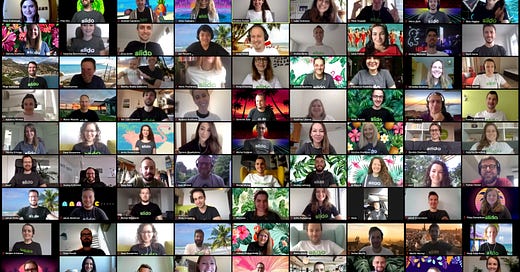Today is my last day at Slido, the Q&A and polling app acquired by Cisco earlier this year. This is exactly 6 years after I met Slido’s co-founder and CEO Peter Komornik for the first time after a friend, and one of Slido’s first employees introduced us.
I feel like I ought to write something grand to close this chapter. But the truth is, there’s way too much I’ve learned during these past 6 years for one celebratory post. I will, however, continue to unpack these lessons on this Substack.
Today, I want to write about the few top-of-mind things I look back on and am grateful for.
Low ego: I was 22 when I joined Slido. Looking back now, I had no idea what it took to be an early startup employee. Working alongside Peter, I’ve learned a great lesson in humility and excellence. Low ego, to me, is the key to an early employee mindset. At every juncture, think about what you can do to move the business forward, and not how you can look good in front of others or get promoted. Do whatever the company needs.
We got lucky many times: There’s a reason Seneca’s quote, “Luck is what happens when preparation meets opportunity.” has its place in Slido’s Culture Code. In a startup, where a lot of the odds are against you in the early days, on top of working hard, you have to be what I call a naive optimist.
Everybody talks to users: You say cliche, but the level of focus on understanding and helping customers succeed I’ve seen at Slido is second to none. I’m grateful that I could learn from Slido’s other co-founder, Peter Krajnak, who built out the user research function from scratch about 4 years ago and embedded it into everyone’s thinking; whether in engineering, design, or customer success.
Taking care of mental health: With joining Slido super early and the ownership that came with it, I often felt as if I was one of the founders. In retrospect, that came at the price of losing my own identity for a few years. I want to dedicate a whole piece to this topic, but the lesson for me was to start taking serious care of my mental, and not just physical health. Whether that is regularly seeing a therapist, setting boundaries, or taking time off.
Space to reflect: I tried to regularly dedicate some time to think, to check in on questions like “What’s the state of the thing I’m working on?“ or “How am I doing?”. But more often than not, I’d just stare at my screen thinking: what the hell did I even do this quarter? The thing I wish I did from the beginning was keep a changelog. I’m thinking self-review notes where I’d just quickly jot down a new accomplishment, challenge, discussion I’d want to remember, and so on. Looking back at something like that would help with imposter syndrome, too.
Thanks for reading. I’d really appreciate it if you left a comment below and let me know if any of the particular reflections resonated with you or if you’d like me to go more in depth on anything.




As someone who was previously employee #2 at an early-stage startup, I can relate with this a lot: "With joining Slido super early and the ownership that came with it, I often felt as if I was one of the founders. In retrospect, that came at the price of losing my own identity for a few years."
During this time I had to continuously remind myself in the past that "I am not my company."
Great post Juraj! Low ego (or in Hopin's case, #noego) is such an important company value, especially at during the early and scaling phases of a startup. At Hopin we constantly had to scrap projects and people's focus often had to change over night or they had to do jobs that were outside of their job description. Nobody ever complained, we just did what's best for the company.